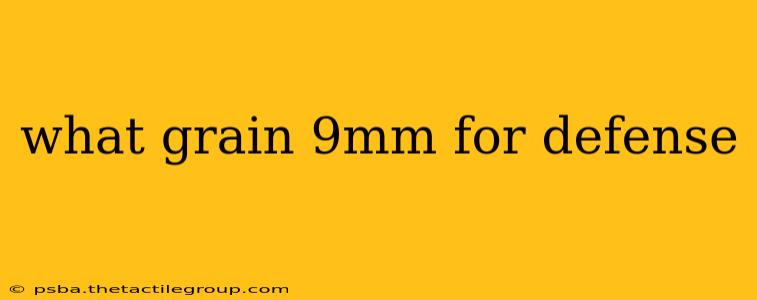What 9mm Grain for Self-Defense? Choosing the Right Ammo
Choosing the right ammunition for self-defense is a critical decision, and for 9mm, grain weight plays a significant role. There's no single "best" grain weight, as effectiveness depends on several factors, including barrel length, personal preference, and the specific situation. However, understanding the nuances of different grain weights will help you make an informed choice.
This article explores the considerations involved in selecting 9mm grain weight for self-defense, helping you navigate the options and choose the best load for your needs.
Understanding Grain Weight and its Impact
Grain weight refers to the weight of the bullet, measured in grains (7000 grains = 1 pound). Heavier bullets generally have more stopping power due to their increased momentum and energy transfer upon impact. However, lighter bullets tend to have higher velocity, resulting in flatter trajectories and less recoil.
Here's a breakdown of common 9mm grain weights and their characteristics:
-
115-grain: These lighter bullets offer high velocity and flatter trajectories, making them suitable for longer-range engagements. However, their lighter weight means potentially less stopping power at close range compared to heavier bullets.
-
124-grain: A popular all-around choice, 124-grain bullets offer a good balance between velocity and stopping power. They are a reliable option for various self-defense scenarios.
-
147-grain: These heavier bullets exhibit lower velocity but deliver significant stopping power due to their increased mass. They also tend to have reduced recoil and muzzle flash. They are often preferred for their subsonic capabilities, making them quieter for use in suppressed weapons.
Factors to Consider Beyond Grain Weight
While grain weight is crucial, it's not the only factor influencing ammo performance. Other important considerations include:
-
Bullet Type: The bullet's design significantly impacts its effectiveness. Common choices for self-defense include:
- Full Metal Jacket (FMJ): These bullets are inexpensive and reliable, but they tend to overpenetrate, posing a risk to bystanders. Generally not recommended for self-defense.
- Jacketed Hollow Point (JHP): These bullets expand upon impact, transferring more energy to the target and reducing overpenetration. A widely preferred choice for self-defense.
- Hollow Point (HP): Similar to JHP but without a full metal jacket. Performance can be less consistent than JHP.
-
Barrel Length: Longer barrels generally yield higher velocity, benefiting lighter grain weights. Shorter barrels can reduce the velocity of lighter bullets, making heavier grains a more effective choice.
-
Personal Preference: Ultimately, the best ammunition is the one you are comfortable shooting accurately and consistently. Practice with different grain weights to find what feels best for you.
Recommendations and Final Thoughts
For self-defense, a 124-grain Jacketed Hollow Point (JHP) is often considered a good starting point. It balances velocity and stopping power effectively. However, 147-grain JHP offers excellent stopping power with reduced recoil, making it a suitable option for individuals who prioritize accuracy and comfort.
Remember to always consult with experienced shooters and firearms professionals for personalized advice. Thorough practice with your chosen ammunition is crucial to ensure proficiency and accuracy under pressure. This information is for educational purposes only; always follow local laws and regulations regarding firearms and ammunition.

